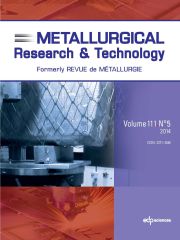Article contents
A new scrap grade for the steel industry: steel wire recycling from the treatment of end-of-life tires
Published online by Cambridge University Press: 15 April 2011
Abstract
This article presents the work carried out to define quality criteria of a new scrap source for the steel industry: steel wires generated by grinding end-of-life tires. The definition of this promising new secondary raw material source is perfectly in agreement with the European Directives 75/442/CEE and 2000/53/EC, dealing with waste and recycling of end-of-life vehicles, thus answering the environmental needs of our society.
Grinding tires generates an interesting secondary raw material (rubber granulates) but also two wastes, steel wires and textile fibers. We estimate that steel wires represent in Europe 180 kt of steel every year which is not, or badly, valorized. This study showed that the recycling of these steel wires in steel mills was possible and viable, one necessary condition being the determination of the non-metallic content remaining on the wires and keeping it lower than 4%.
Keywords
- Type
- Research Article
- Information
- Copyright
- © EDP Sciences
- 1
- Cited by




